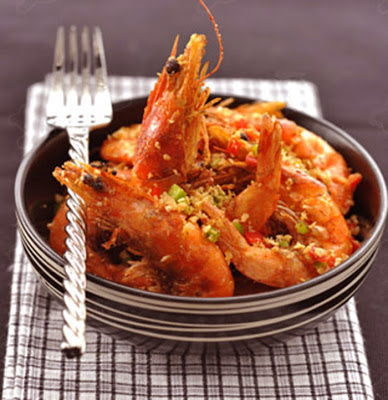Mantis shrimp or stomatopods are
marine crustaceans and it is the members of the order Stomatopoda. The shrimp
is a fascinating creature that has the ability to punch its prey into
submission with a club that accelerates underwater at around 10,400 g. It is
called "sea locusts" by ancient Assyrians, "prawn killers"
in Australia
and now it also referred as "thumb splitters" because of the animal's
ability to inflict painful gashes if handled incautiously.
 |
| A delicious sea food made by Mantis shrimp |
They may reach nearly 30 centimeters
in length but in exceptional cases it has been recorded up to 38 centimeters.
The carapace of mantis shrimp covers only the rear part of the head and the
first four segments of the thorax. Mantis shrimp appear in a variety of colors,
from shades of browns to bright neon colors. Mantis Shrimp are crustaceans that
live in shallow waters and normally grow to about a foot long. More then 400
species of mantis shrimp have currently been described worldwide. They are
commonly separated into two distinct groups (Spearers and Smashers) determined
by the manner of claws.
 |
| Mantis shrimp - beautiful sea creature |
The mantis shrimp has very powerful
claws that they use to attack and kill prey by spearing, stunning, or
dismemberment. Although it happens rarely, some larger species of mantis shrimp
are capable of breaking through aquarium glass with a single strike from this
weapon. The mantis shrimp uses its formidable weapon to break the shells of its
prey but, until recently, it was unclear how its club could receive such a
severe, repetitive pounding without suffering too much damage. The club, in
fact, handles as many as fifty thousands strikes during its lifespan.
 |
| A appetizing chinese food made by Mantis shrimp |
The
mantis shrimp in Cuisine: In
Japanese cuisine, the mantis shrimp is eaten boiled as a sushi topping, and
occasionally, raw as sashimi. In Cantonese cuisine, the mantis shrimp is known
as "pissing shrimp". In the Mediterranean countries the mantis shrimp
Squilla mantis is common seafood, especially on the Adriatic coasts and the Gulf of Cadiz. In the Philippines it is cooked and eaten
like shrimp like other shrimps and known as tatampal, hipong-dapa or
alupihang-dagat.

No comments:
Post a Comment